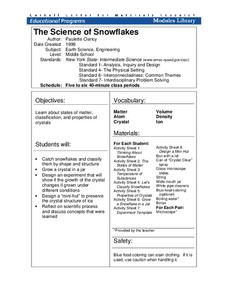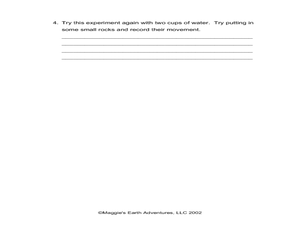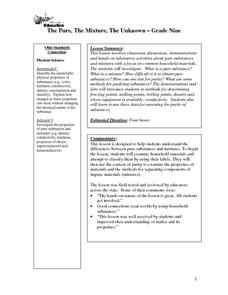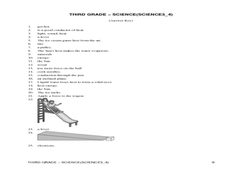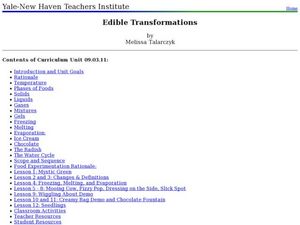Science Geek
Basic Thermochemistry
Heat is more than just temperature, as viewers discover throughout a presentation about thermochemistry that emphasizes vocabulary. Definitions include joule, calorie, energy, enthalpy, calorimetry, exothermic and...
K12 Reader
The Rock Cycle
This cross-curricular reading comprehension learning exercise asks kids to read a passage of the rock cycle and then to use information in the article to respond to a series of questions.
K12 Reader
The Inner Planets
Here's a reading exercise that uses an article about the inner planets to assess comprehension. After reading the article, kids respond to a series of questions using information from the text.
Aquarium of the Pacific
States of Matter: Making Ice Cream
Who knew that learning about the states of matter could taste so sweet? This fun hands-on lesson captures the attention of learners as they use what they know about solids, liquids, and gases to create their very own batch of ice cream.
Urbana School District
Fluids
In 1879, Sir William Crookes discovered the fourth state of matter, plasma. The presentation covers states of matter, phase changes, density, pressure Pascal's Principle, buoyant force, Archimedes' Principle, Bernoulli's Principle,...
Science Geek
Phase Changes
Examine the energy transfer of phase changes through diagrams. The second slide show in a series of seven presents the information related to energy and phase changes. It includes the effect of pressure on phase changes.
American Chemical Society
The Energy of Evaporation
Do all liquids evaporate at the same rate? Young scientists observe the evaporation rate of three different liquids. They measure the time, the temperature, and the change in energy. After comparing the chemical formulas, scholars...
Cornell University
The Science of Snowflakes
Who can grow the best crystals? Challenge class members to develop strategies for enhancing growth in the crystals. Through a lab investigation, learners study the properties of crystals and test the effectiveness of different...
Curated OER
Water and Ice
Students explore the states of water. In this water states lesson plan, students observe ice over time and the changes that take place. Students read a related text and draw their observations in a journal entry. Students discuss the...
Curated OER
Land of No Trees
In this Land of No Trees activity, students read a passage titled "Land of No Trees" about the Arctic Tundra and complete an experiment and short answer questions about it. Students complete an experiment with a plastic container, soil,...
Curated OER
When You're Hot, You're Hot!
Eighth graders examine the development of the different temperature scales. They experiment with hot and cold temperatures.
Curated OER
The Pure, The Mixture, The Unknown
Ninth graders participate in classroom discussions, demonstrations and hands-on laboratory activities about pure substances and mixtures with a focus on common household materials. They investigate: What is a pure substance? What is a...
Curated OER
Seashore Explorers
There are three separate lessons within this resource that can be used together, or that can each stand alone. In the first, five simple activities allow junior scientists to examine the amazing properties of water. In the second, they...
Curated OER
Third Grade Science Multiple Choice Practice
In this 3rd grade science worksheet, 3rd graders complete a total of 25 multiple choice questions related to grade 3 concepts. An answer key is given.
Curated OER
March of the Polar Bears: Global Change, Sea Ice, and Wildlife Migration
Young scholars study global change and how these changes impact wildlife. In this polar bears lesson plan students analyze maps and data to understand climate change.
Curated OER
Clerihew Dances II
Third graders explore rhythm and quality of word and phrased to that of dance. They move to the rhythm of poetry.
Parkway Schools
Phase Changes and Heat
For this phase changes learning exercise, students use the specific heats for different substances to determine how much heat is needed for those substance to change phases. This learning exercise has 9 problems to solve.
Curated OER
Environmental Studies: The Environment Rocks!
Rock exploration, so exciting! After reading the book Everybody Needs a Rock, the class makes sandwiches to better understand that the Earth is made in layers. They then use a description of the 3 types of rock to conduct an observation...
Curated OER
Ice Energy
Learners observe the chemical reaction that occurs when salt is put on ice, and use the energy that is released to make ice cream.
Curated OER
Ice Energy
Students study the concept of ice energy. For this ice energy lesson, students observe what happens when salt is sprinkled on a piece of ice before following a recipe to make two types of ice cream. They note the difference in the two...
Curated OER
Phase Changes
In this phase change worksheet, students read about the particles in substances that speed up and slow down for substances to change phases. They answer eight questions about phase changes, the states of matter and how changing...
Curated OER
Edible Transformations
Students differentiate the different phases of matter. In this chemistry lesson, students conduct several hands-on exercises to discover how matter transforms when mixed together. They identify the different stages in the water cycle.
Curated OER
Heating/Cooling Curve
In this heating and cooling curve worksheet, students use a given graph of a substance being heated from a solid to a liquid and then a gas over time. They use the graph to answer eleven questions about the phases of the substance and...
Curated OER
Erosion Deposition Review
In this erosion deposition worksheet, students fill in 36 blanks to complete sentences about the formation of soil, the forces of erosion, physical and chemical weathering, sediments and soil deposition.
Other popular searches
- Freezing Melting Point
- Melting and Freezing Water
- Melting and Freezing
- Ice Melting and Freezing
- Freezing and Melting Points









